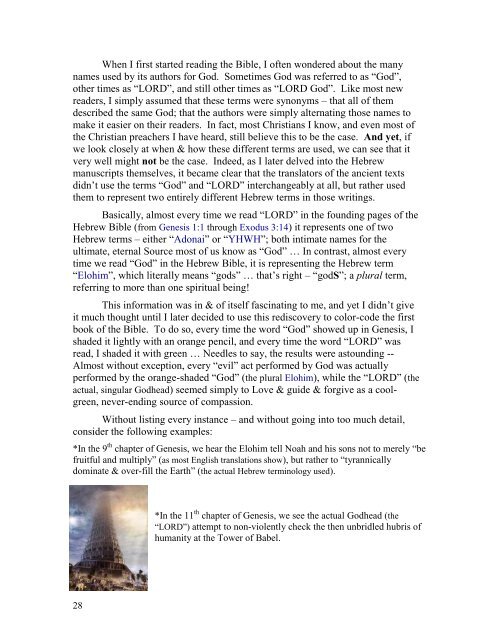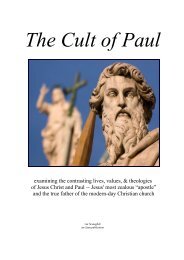Preserving Paradise (3rd edition)
A scripturally-sound and spiritually-neutral examination of what both reason & the Bible have to say about damnation & salvation; (including an exposé of the practical, non-religious consequences of each) … A tome of eternal importance for believers & non-believers alike.
A scripturally-sound and spiritually-neutral examination of what both reason & the Bible have to say about damnation & salvation; (including an exposé of the practical, non-religious consequences of each) … A tome of eternal importance for believers & non-believers alike.
You also want an ePaper? Increase the reach of your titles
YUMPU automatically turns print PDFs into web optimized ePapers that Google loves.
When I first started reading the Bible, I often wondered about the many<br />
names used by its authors for God. Sometimes God was referred to as “God”,<br />
other times as “LORD”, and still other times as “LORD God”. Like most new<br />
readers, I simply assumed that these terms were synonyms – that all of them<br />
described the same God; that the authors were simply alternating those names to<br />
make it easier on their readers. In fact, most Christians I know, and even most of<br />
the Christian preachers I have heard, still believe this to be the case. And yet, if<br />
we look closely at when & how these different terms are used, we can see that it<br />
very well might not be the case. Indeed, as I later delved into the Hebrew<br />
manuscripts themselves, it became clear that the translators of the ancient texts<br />
didn‟t use the terms “God” and “LORD” interchangeably at all, but rather used<br />
them to represent two entirely different Hebrew terms in those writings.<br />
Basically, almost every time we read “LORD” in the founding pages of the<br />
Hebrew Bible (from Genesis 1:1 through Exodus 3:14) it represents one of two<br />
Hebrew terms – either “Adonai” or “YHWH”; both intimate names for the<br />
ultimate, eternal Source most of us know as “God” … In contrast, almost every<br />
time we read “God” in the Hebrew Bible, it is representing the Hebrew term<br />
“Elohim”, which literally means “gods” … that‟s right – “godS”; a plural term,<br />
referring to more than one spiritual being!<br />
This information was in & of itself fascinating to me, and yet I didn‟t give<br />
it much thought until I later decided to use this rediscovery to color-code the first<br />
book of the Bible. To do so, every time the word “God” showed up in Genesis, I<br />
shaded it lightly with an orange pencil, and every time the word “LORD” was<br />
read, I shaded it with green … Needles to say, the results were astounding --<br />
Almost without exception, every “evil” act performed by God was actually<br />
performed by the orange-shaded “God” (the plural Elohim), while the “LORD” (the<br />
actual, singular Godhead) seemed simply to Love & guide & forgive as a coolgreen,<br />
never-ending source of compassion.<br />
Without listing every instance – and without going into too much detail,<br />
consider the following examples:<br />
*In the 9 th chapter of Genesis, we hear the Elohim tell Noah and his sons not to merely “be<br />
fruitful and multiply” (as most English translations show), but rather to “tyrannically<br />
dominate & over-fill the Earth” (the actual Hebrew terminology used).<br />
*In the 11 th chapter of Genesis, we see the actual Godhead (the<br />
“LORD”) attempt to non-violently check the then unbridled hubris of<br />
humanity at the Tower of Babel.<br />
28


















